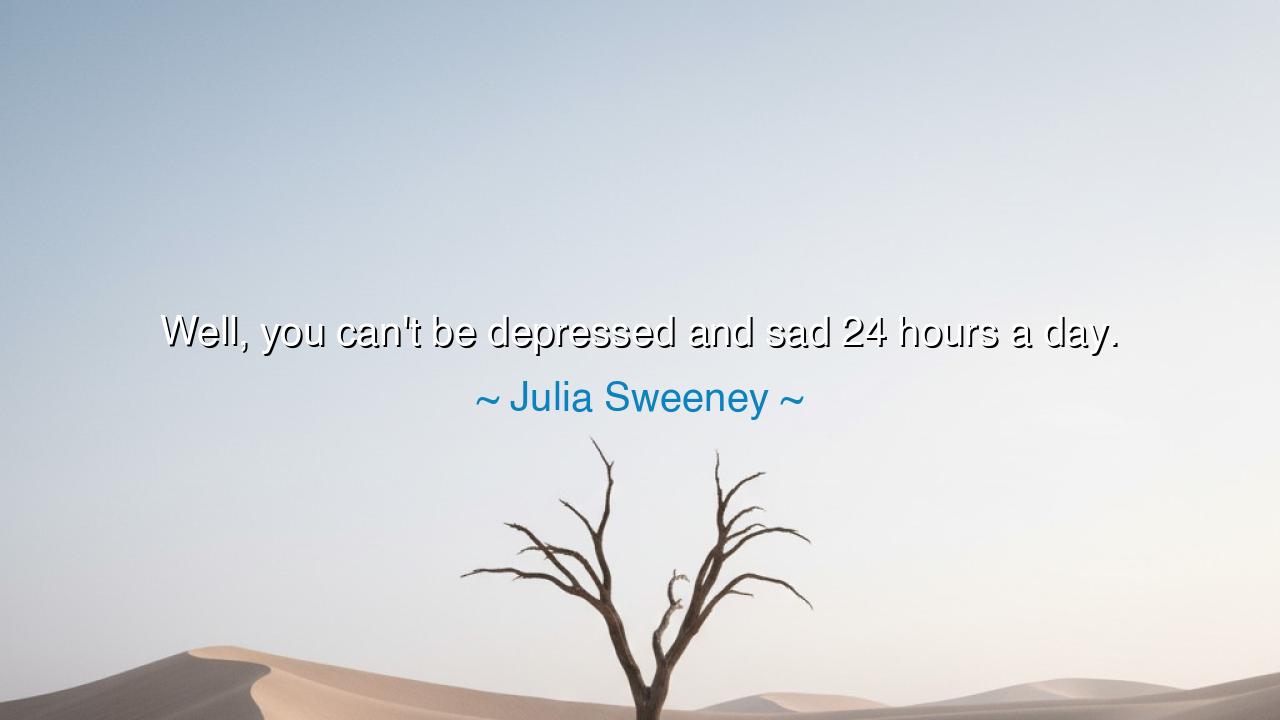
Well, you can't be depressed and sad 24 hours a day.






The words of Julia Sweeney, “Well, you can’t be depressed and sad 24 hours a day,” seem simple, almost lighthearted, yet they conceal within them the ancient wisdom of endurance. Beneath their surface lies a quiet truth about the human spirit: that even in the darkest storms of sorrow, the light of life cannot be wholly extinguished. Sweeney, who spoke these words after facing profound personal loss and illness, reminds us that suffering has rhythm, that even grief must breathe, and that the human heart, though burdened, will always find small moments of reprieve. It is a truth that poets, philosophers, and survivors have whispered since the dawn of time—that pain may visit the soul, but it cannot rule it forever.
To say one cannot be “sad 24 hours a day” is not to diminish sorrow, but to honor the resilience woven into our being. For even in despair, the heart hungers for laughter, for beauty, for the faint pulse of joy. Life, in its divine wisdom, refuses to let the human spirit drown completely. The ancients called this the equilibrium of the soul, the natural balance that pulls us, even unconsciously, toward healing. When the mind is broken, the body still breathes; when the heart weeps, the world still offers the warmth of the sun. Sweeney’s words remind us that grief is a guest, not a ruler—it may dwell with us for a time, but it cannot claim the entire day, nor the entire life.
In the annals of history, we find this same truth embodied in the life of Victor Frankl, the psychiatrist and survivor of the Holocaust. In the midst of a concentration camp, surrounded by death and despair, he observed something extraordinary: even there, men laughed. They shared jokes, whispered songs, remembered beauty. Amid unspeakable suffering, moments of light emerged—not because life was kind, but because the human spirit refused to yield. Frankl later wrote, “Everything can be taken from a man but one thing: the last of the human freedoms—to choose one’s attitude.” This is the essence of Sweeney’s insight: that even in depression and sadness, life still grants us brief islands of peace, moments where laughter rises like a flame against the darkness.
The quote also reminds us that sorrow, when stretched too far, begins to lose its shape. Just as night gives way to dawn, grief too must shift, transform, or rest. The wise have always known that emotions are cyclical, not constant. The Stoics taught that even despair follows nature’s law: it waxes and wanes, and in its ebb lies the seed of recovery. Thus, to endure sadness is not to be crushed by it, but to allow it to move through you, knowing that its tide will one day recede. To believe that one can remain sad forever is to misunderstand the heart’s infinite capacity to regenerate. Even when all feels lost, life itself conspires to pull us back toward the living.
But there is another layer to Sweeney’s wisdom—a layer of gentle defiance. In saying “you can’t be depressed 24 hours a day,” she challenges the fatalism that sometimes cloaks despair. It is as though she whispers to every suffering soul: Even now, there is a corner of joy left for you. A bird still sings, a child still laughs, a memory still warms. She invites us not to deny our sadness, but to look beyond it, to recognize that even pain cannot completely erase our humanity. The very act of noticing this truth is itself an act of healing—a reclaiming of one’s strength against the weight of sorrow.
The ancients might have compared such resilience to the phoenix, that mythical bird which perishes in fire only to rise again from its ashes. For every human being, the cycle of sadness and renewal mirrors this same myth. We burn in our grief, yet even from our darkest moments, something within us stirs—a faint will to live, to laugh again, to continue. This, perhaps, is the divine spark that no despair can smother: the instinct to survive, not merely in body, but in spirit.
So let this teaching be passed down: do not believe that sorrow is endless, for no heart can bear a storm forever. When you find yourself trapped in the shadow, remember Sweeney’s quiet wisdom: even sadness must rest, even tears must stop to breathe. In that pause lies your chance to glimpse the world anew—to find one small reason to smile, one small thread of beauty to hold. Let that be your beginning. For though darkness may claim the night, dawn always returns, and within every soul lies the unyielding truth that you cannot be sad 24 hours a day—because life, in its mercy, always finds a way to lift you up again.






AAdministratorAdministrator
Welcome, honored guests. Please leave a comment, we will respond soon